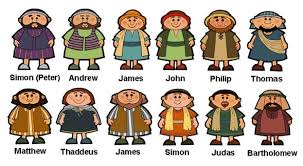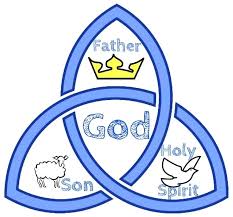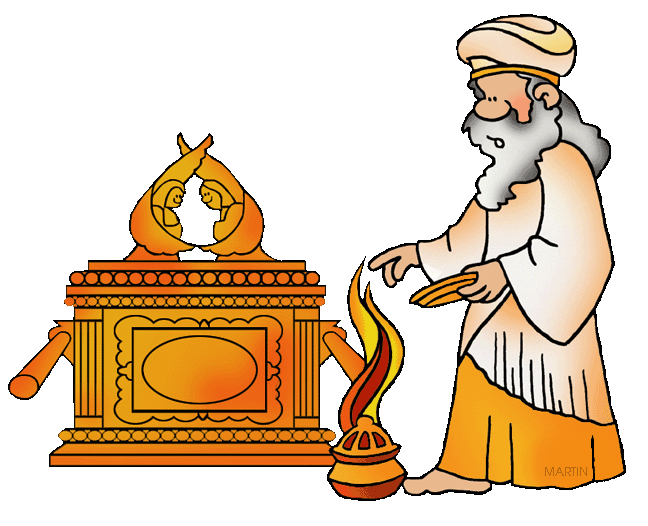John 16:12 – "I still have many things to say to you, but you cannot bear them now."
In his 'farewell address' to the apostles, Jesus has been revealing to them a great many truths and doctrines which would apply to the gospel dispensation.

These truths were more like an outline or framework for what was to come - the message of salvation, the age of grace, the establishment of the church, the coming of Holy Spirit etc. Jesus had not given them the exact details of how everything would work.
There are a couple of reasons why Jesus did not fully disclose his future plans to them at this time:
- They literally couldn't absorb all of the information at one time. Studies show that the average person can concentrate/maintain focus for about 40-45 minutes before their mind starts to wander, and information retention starts to decrease. So there was no way the disciples could have learned and retained all of the information they needed to know in such a short period of time.
- Some of God's plans wouldn't make any sense at this time, because the disciples were still full of Jewish prejudices and false ideas regarding the Messiah and his kingdom. Remember, they were just now beginning to understand that Jesus wasn't going to immediately establish his earthly kingdom. They were just beginning to fathom that their path was one of suffering and hardship, not one of celebrity and ease in Jesus' new government.
- Some of the coming changes were so shocking that no Jewish person could possibly be prepared to accept/embrace them. Think about it for a minute. Under the law, only certain men could be priests but under grace, every Christian was admitted to the royal priesthood. Under the law, animal sacrifices were necessary but under grace all blood sacrifices ceased. Under the law, only Jews could be in right standing with God but under grace even Gentiles were accepted into the family of God. The new covenant was shocking indeed!
Truthfully, the only way the disciples were going to understand the full gospel message was by the aid of Holy Spirit.
John 16:13 – "When the Spirit of truth comes, he will guide you into all the truth, for he will not speak on his own authority, but whatever he hears he will speak, and he will declare to you the things that are to come."
In this verse Jesus refers to Holy Spirit as the Spirit of Truth because it was/is his job to instruct believers in the truths of God.
In this particular case, Holy Spirit is going to guide the apostles into truth which pertained to the establishment of the church. Once Jesus had died and risen again, Holy Spirit could open their eyes to the true plans and purposes of God regarding the plan of salvation. Things that made no sense to them at the moment would become clear after Jesus' death and resurrection.

Holy Spirit is described as revealing or declaring 'things that are to come'. Keep in mind that Jesus spoke these words before his final suffering began. Therefore, everything that was about to happen (including his crucifixion and resurrection), were still future events.
Jesus is saying that the Spirit was going to reveal the meaning of events that were to take place after the time he was speaking to them. This would include the necessity of his death and the changes that were going to take place in the new dispensation of grace. Holy Spirit would also open their understanding so they could see how Old Testament prophesy pointed directly to Jesus as the Messiah (for example, Isaiah 53).
The good news is that Holy Spirit's job didn't end with the apostles.
There are still many portions of scripture (the book of Revelation, portions of Daniel, Ezekiel and many of the minor prophets) which have not yet been fulfilled. In fact, God has truths which he will only reveal when the time is right for us to understand them:
Daniel 12:4 - But you, O Daniel, shut up the words, and seal the book, even to the time of the end: many shall run to and fro, and knowledge shall be increased.
Habakkuk 2:3 - For the vision is yet for an appointed time, but at the end it shall speak, and not lie: though it tarries, wait for it; because it will surely come, it will not delay.
This is one more instance which proves that we need Holy Spirit now more than ever! We need him to reveal/interpret the truth of scriptures that apply to this generation, so we can successfully partner with God and bring his will to pass on earth.
John 16:14 – "He will glorify me, for he will take what is mine and declare it to you."
'He will glorify me' – As we noted before, each member of the Trinity has accepted a different role in the salvation of mankind. The role of Holy Spirit is to establish the kingdom of Christ and to confirm all that Jesus received from the Father. Holy Spirit will always honor Jesus; everything he does will exalt Christ (I Corinthians 12:3).
For instance, the gifts that Holy Spirit gives (word of wisdom, word of knowledge, discerning of spirits, gifts of healing, public tongues and interpretation, etc) are all used to exalt Christ.

When a Christian prays for and unbeliever and they receive a gift of healing from the Spirit, that healing is possible because of the work of Jesus who took stripes on his back for our healing (I Peter 2:24). The healing creates faith in the person who was healed, causing them to place their trust in Christ and receive salvation. Thus, Jesus is glorified by the work of the Spirit.
Another example would be when a Christian receives a supernatural word of wisdom for a brother or sister in Christ. This timely wisdom will somehow edify/encourage or otherwise give victory to the one who receives it. This in turn will strengthen or increase the faith and ministry of the hearer (and all those around him/her). So again, the Spirit is establishing and strengthening the kingdom of Christ, which glorifies Jesus.
Holy Spirit also helps us to cultivate spiritual fruit in our lives (Galatians 5:22-23). When Christians develop this fruit it makes us more Christ-like and brings further glory to Jesus.
Holy Spirit also works to convict unbelieving men and women of sin, and prompts them to turn to Christ for forgiveness. Thus, the Spirit works to increase the kingdom of Christ.
We could give other examples as well, but the bottom line is that Holy Spirit's role in the salvation of man is to establish and confirm the kingdom of Christ. Everything he does glorifies Jesus.
'He will take what is mine' – Holy Spirit did not come to earth to start a new kingdom. Instead, he functions as an ambassador of sorts – he receives his commission and instructions from Jesus. He does the will of Jesus and assists in completing his work upon the earth.
'Declare it to you' – The Spirit communicates/explains/reveals the truths of God to mankind. He does this because of our own weaknesses.
It is important to understand that the revelation that Jesus brought us was not an imperfect revelation that Holy Spirit had to supplement. Jesus brought us a full and perfect revelation from God, but we received his doctrine imperfectly. Therefore it was necessary to have the Spirit illuminate our hearts and guide us into all truth.
John 16:15 – "All that the Father has is mine; therefore I said that he will take what is mine and declare it to you."
There can be no doubt that the Father, Son and Spirit are all of the same divine essence, wisdom and power. They work together to accomplish their purposes.
Jesus was an ambassador for the Father; he said and did only what the Father told him to. He revealed the Father to mankind. In the same way Holy Spirit is an ambassador for Christ; he comes in Christ's authority as the interpreter and executor of his will.
John 16:16-17 – "A little while, and you will see me no longer; and again a little while, and you will see me. So some of his disciples said to one another, "What is this that he says to us, 'A little while, and you will not see me, and again a little while, and you will see me'; and, 'because I am going to the Father'?"
Scholars offer different interpretations of this verse:
One: In less than 24 hours, Jesus was going to be crucified and placed in a tomb. Thus, in a little while they would 'see him no longer'. Then after three days in the tomb, he would arise from the grave and be seen by many witnesses.
Acts 13:31 - And he [Jesus] was seen many days of them who came up with him from Galilee to Jerusalem, who are his witnesses unto the people.
Two: Some interpret this statement in a more long-term sense. The disciples would no longer see Jesus after his ascension to the Father in heaven:
Acts 1:9 - And when he [Jesus] had spoken these things, while they beheld, he was taken up; and a cloud received him out of their sight.
But they would surely see him again once they died and entered eternity.
Three: The disciples would no longer see Jesus in his physical form after he ascended to heaven. However, once Holy Spirit came to earth and gave them clear insight into the plan of salvation, they would see the evidence of Jesus in the work of Holy Spirit.
Finally, there are some who believe that in 'a little while you will see me' refers to the second coming to earth. Scripture says that at that time 'every eye shall see him' (Revelation 1:7).
Regardless of which explanation you think is best, the end is the same – one day you and I will find ourselves at the foot of God's throne, looking at our Savior. What a glorious time that will be!
John 16:18-19 – So they were saying, "What does he mean by 'a little while'? We do not know what he is talking about. Jesus knew that they wanted to ask him, so he said to them, "Is this what you are asking yourselves, what I meant by saying, 'A little while and you will not see me, and again a little while and you will see me'?"
Many scholars feel that the enigmatic saying of Jesus had a specific purpose – to grab the attention of the disciples and to spur them on towards seeking knowledge. It was time for them to stop feeling sorry for themselves and begin to understand that it was truly better for them that Jesus departed, so that Holy Spirit could come and God's plan for mankind could move forward (John 16:7).

It is interesting to note that God still does this in our day. He may give you a dream or vision which requires you to seek out the correct interpretation.
When this happens to you, be sure to follow through until you have a satisfactory explanation; God is blessing you with a revelation of him or his kingdom (Proverbs 25:2).
Because they are now eagerly seeking out the meaning of Jesus' saying, he begins to reveal the answer to them.
John 16:20 – "Truly, truly, I say to you, you will weep and lament, but the world will rejoice. You will be sorrowful, but your sorrow will turn into joy."
Jesus tells the disciples that his followers would weep and lament when faced with his suffering, crucifixion and death (Luke 23:27). These same events would cause 'the world' or wicked people to rejoice and be glad. In this case, 'world' refers to unbelievers in general, but specifically to the Jewish leaders (Pharisees, scribes, priests, etc) who adamantly opposed Jesus' claim to be the Messiah.

But things are not always as they seem. Jesus would rise again; the sorrow of the disciples would be mitigated. Jesus would return bringing salvation, healing, comfort and peace as well as eternal joy in the world to come. Although the disciples did not fully understand this at the time, they could console themselves with the assurances of Jesus that his death would be for their good.
In all generations (including ours), it sometimes seems like evil triumphs over good. The apparent triumphs of the wicked certainly produce grief in the minds of Christians, but we can rest assured they will not endure.
The temporary triumph of the wicked is the topic of Psalms 73. This powerful Psalm was written by Asaph, a Levite who was one of King David's worship leaders. The first half of this Psalm centers on the grief he feels when he sees the victory/prosperity of the wicked.
But in the second half of the Psalm he talks about entering into the presence of God, where he received a revelation that, unlike the final outcome of the righteous, the 'success' of the wicked was only temporary. When the Lord takes action against them, they will be destroyed in a moment.
If you haven't read this Psalm in a while, you might want to consider doing so this week!
John 16:21 – "When a woman is giving birth, she has sorrow because her hour has come, but when she has delivered the baby, she no longer remembers the anguish, for joy that a human being has been born into the world."
Jesus uses the example of a woman in labor to further illustrate his point that the sorrow of his followers will be turned into joy.
As we all know, women in labor will naturally experience a great amount of pain until the child is born (Genesis 3:16). But once that happens, her sorrow is swallowed up in joy as she holds her infant.
In the same way, the sorrow which the disciples will endure for the sake of the gospel will not last forever. Any/all suffering they experience will be worth it; they will be eternally blessed in God. And even in the midst of trials and tribulations Christians will experience the joy of Christ.
John 16:22 – "So also you have sorrow now, but I will see you again, and your hearts will rejoice, and no one will take your joy from you."
When Jesus says he will see his disciples again, he is referring to being with them through the person of Holy Spirit. Since Holy Spirit dwells in the hearts of believers, they can continually enjoy the presence of God at all times. This joy cannot be taken by the world, because its source is divine.
In addition, once Jesus rose and Holy Spirit came, the disciples would be so firmly convinced that Jesus was the Messiah, that no amount of persecution or threats could shake their faith. In the midst of all their afflictions, they had an unshakable source of joy, which no enemy could take away.
All Christians can truly agree with Mary the mother of Jesus who said, "My spirit has rejoiced in God my Savior" (Luke 1:47).
Let me offer you some encouragement:
The Christian walk definitely contains elements of sorrow and pain. Jesus never hid this fact from any of his followers. But at the same time, Jesus makes it clear that our sorrow is only temporary. The longest it can possibly last is until the end of our lives; once we go to be with him there will be no more sorrow or tears.
As King David says, 'weeping may endure for a night, but joy comes in the morning' (Psalms 30:5).
So when you endure those times of suffering/pain, don't let them steal your joy. Your end has already been determined by God and it is going to be greater than anything you can imagine!
Let me offer you some relief:
The disciples didn't fully understand every single doctrine that Jesus spoke to them. But that was okay because Holy Spirit came to guide them into all truth.
Are there portions of scripture or other spiritual things that you don't fully understand? If so, go to the Lord in prayer and ask Holy Spirit to reveal the truth to you. It may just be that he is standing by right now, waiting for you to dig in and investigate the issue with him.
Let me offer you some strength:
We could describe Jesus as an ambassador of God. He came to reveal the Father to the world and he only said/did the will of Father God.
Likewise, we could describe Holy Spirit as an ambassador for Jesus. He does the will of Jesus and assists in completing his work upon the earth.
The question is, are we acting as ambassadors for the Father, Son and Spirit? Do we listen to God's voice and work to fulfill his commands of spreading the gospel to every nation on earth and making disciples of others?
If not, what is holding us back? Whatever it might be, lets get rid of it, so we can successfully run the race that God has set before us.









































